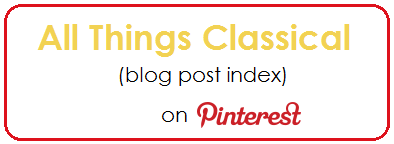This post contains an affiliate link to the book that we are going through.
Welcome to another week of the
Teaching the Trivium book club! I am so excited to read and discuss this book along with you. I loved the discussion last week and would love to hear from more of you!
Today we talk about homeschooling methods.
Chapter 10 - Different Methods and Approaches to Homeschooling in Light of the Trivium
Today we are talking about how you can apply the principles of the trivium to different homeschooling methods. Honestly I had never really though about applying the trivium outside of the classical model before. This chapter was very interesting to me!
First, the Bluedorns go through six different general homeschooling methods and evaluate how the principles of the trivium would fit with each of them. Here are the six methods:
- Scope and Sequence Method
- Charlotte Mason Method
- Unschooling Method
- The Unit Study Approach
- The Formal Classical Approach
- The Principle Approach
I'm not going to go through each of them. I'm mostly going to talk about the Charlotte Mason method, just because it has always had a place in the back of my mind. I really like the gentle manor of that method and it does me well to strive for it =) If you want to talk about any of the other methods, either write up a post and link it at the end, or leave a comment and we can all chat more there!
Are you a true classical educator or do you take more of the applied trivium approach to another method?
The Charlotte Mason Method and the Trivium
When I think of the Charlotte Mason method of homeschooling, I always see the similarities to classical homeschooling. Thanks to the Bluedorns, now I see that it has a lot to do with how it easily applies the principles of the trivium, and not necessarily because it is strictly classical in nature.
Both methods like to study history chronologically and understand subjects in a logical sequence. Both methods use narration, copywork, living books, and desire to create in their students a love of learning (leading to self-education).
They differ fairly greatly in the grammar stage. The classical model sees a child's great ability to absorb information and requires lots of memorization in the early years. The Charlotte Mason method takes a much gentler approach to the early years, focusing on training in habits, self-control, character, etc.
Honestly, I think both are true =) The main problem for me is that there are only so many hours in the day. I love seeing my children memorize incredible amounts of information, but going through our memory box takes up a chunk of our homeschool day. I deeply desire to train my children in the ways of Charlotte Mason, but shamefully I am not always consistent with my efforts. I am hoping to be more purposeful with that this summer. Maybe I'll call it the Charlotte Mason Summer!
For the most part, the Habitual Method of Charlotte Mason and the Applied Trivium fit together quite well. They complement and reinforce each other. When combined, they enrich the homeschool experience. pg.281
Formal Versus Non-Formal Early Academics
The last part of the chapter is spent talking about delayed formal academics. This is where I believe the Bluedorns stray from the traditional path of classical education. I understand now why they say that the approach they prescribe is the
applied trivium, not so much the formal classical method. Their approach on this topic lines up more closely with the Charlotte Mason method. This is also why their suggested ages in past chapters have seemed a little behind compared to other classical sources that I have read.
I am certainly not a professional, but I do have lots of thoughts and questions about this topic. I see children as young as preschool age with amazing capacities to learn. My thought thus far has been "why waste this!" Both of my kids started reading at age 3 and having regular school times then too. That being said, the lessons are not long and I wouldn't consider them 'formal' like traditional school. I can't imagine not continuing to fill them with information as they increase in abilities.
The Bluedorns talk about the importance of instilling a good moral foundation in the early years. They say that foundation will lead to a more productive academic future. I completely agree. We emphasize this in my home from toddler age up. It is hard to be consistent, though, and I am happy to be encouraged to work hard at it!
They also talk about how early academics can cause problems in a child's brain. This worries me a little bit!
We emphasize that the physical properties of the brain should be fully developed before engaging in those activities which place stress on those properties.
I don't think I've really heard anyone talk like this before. How are you to know when your child's brain is developed in different areas? Can anyone shed any light on this topic?
The Bluedorns said two things that were directed right at me. First, that parents "may expect their children to perform at adult levels of ability." (pg 291) I certainly don't mean to to this to my children, but I know that I have caught myself thinking this way before.
Secondly, "they may simply be trying to find ways to keep the curious little rascals plenty busy and out of trouble." (pg 291) This was the case with my first born. From baby on up, he was not one to entertain himself or to be happy in an imaginary world. He needed my presence and direction in order to be content. That is why I started set preschool times with him at age 2. My daughter is completely the opposite. From the time she was a baby, she has been able to happily entertain herself. She loves to sit for an hour making cards or coloring pictures. She will play in her room with her play kitchen or dressing up. I've said many times that if she was my firstborn, I probably wouldn't have started any formal type school time until she was in kindergarten.
What do you think about delayed formal education?
How do you apply that concept to your homeschool?
I think what I need to keep in mind is this (pg 292):
"Never discourage a child from learning, but neither should we over press academics to the point of strain or exasperation."
Thanks for reading along this week! Leave comments here on the blog post, or share about it on social media
(#ClassicalMamasRead). I'll be sharing too, so follow me on
facebook,
twitter, or
google+ and we can chat about it there as well! Don't forget, if you want to share your thoughts about Teaching the Trivium on your own blog, link it up below so we can all come and visit!
Next week we will be talking about chapter eleven of
Teaching the Trivium. If you haven't gotten your own copy yet, make sure you check your library or order one soon so you can be ready for next time! Also, this is a 600+ page book, so I am only touching on certain points of each chapter. There is so much great information that I am not covering, so if this discussion interests you, you are going to want to make sure to
pick up your own copy so you can read more!
Classical Mamas Read Link-Up
Did you write about
Teaching the Trivium on your blog? Have you been reading and blogging about another book (for
you,
not a children's book)? Do you have a book club going on at your blog
(once again, not for a children's book)? I'd love for you link up here
so we can all be encouraged by each other and maybe find another great
book to read!
I think I'm going to keep this link-up
ongoing since there aren't going to be a huge number of posts and then
anyone new will be able to be encouraged by the other book reading ideas
and discussions. If the number of posts gets too large, I will fix it.
Please note, all posts must be on topic (about a book you are reading) and appropriate (think family friendly).
































